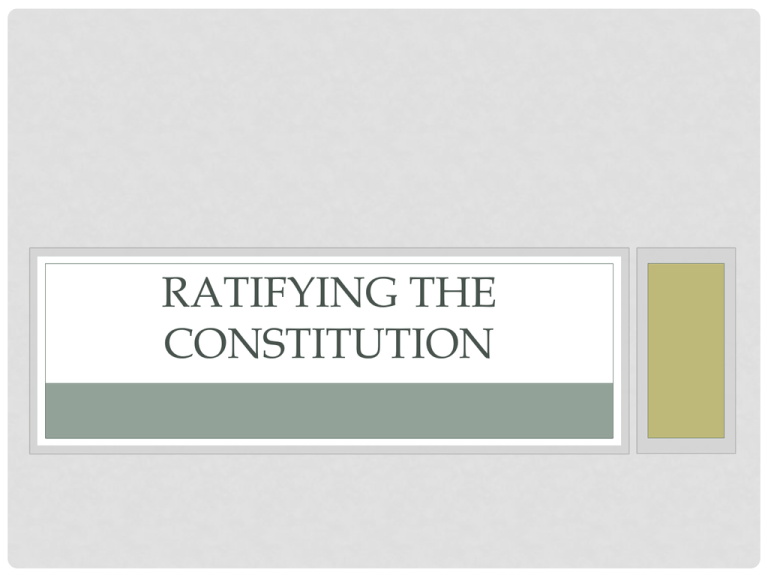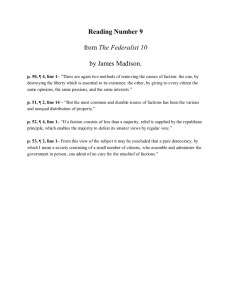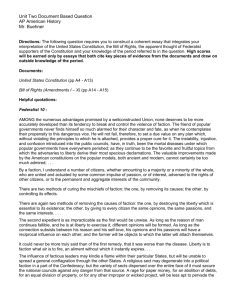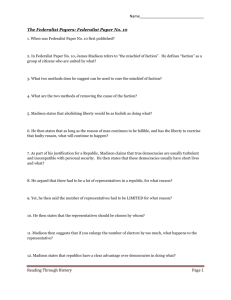Ratifying the constitution
advertisement

RATIFYING THE CONSTITUTION RECAP • Final Draft of U.S. Constitution: September 17th, 1787 • How did we create a government that is strong enough to prevent Shay’s Rebellion, but weak enough to preserve liberty? • How much DIRECT democracy will the people practice? Indirect democracy? • Federal System of Government: • Power shared between states and national authorities • Educational system: Reserved for states • Declaring war: Federal Government • Separation of Powers: • Legislative, Executive, Judicial • Checks and Balances • President can veto acts of Congress • Congress can overturn veto with 2/3 vote of each house • Prevents tyranny or misuse of power Congress House of Representatives: (example of Direct Democracy) • 435 seats • Population size determines the number of seats that each state receives. • Members serve two year terms • Bills to raise money must be introduced in the HOR alone Senate: (use to be an example of indirect democracy) • 100 seats • Elected by state legislatures, not by voters (1913, 17th Amendment establishes direct election of senators by the people.) • Serve six year term (Every 2 years, 1/3 of Senate comes up for reelection) • Allowed to give advice and consent to the President with treaties and judicial appointments President • 4 year term (Could be re-elected as many times as he wanted) 22nd Amendment changes this • Chosen from vote of electors from each state. Each state gets as many electors it has members of Congress. • Electoral College, or group of electors becomes President. • 538 Voters in Electoral College • 270 is the Magic Number today (51%) • If Electoral College cannot come to the Magic Number, it moves to the HOR • Electoral Voters go with Popular Vote most of time • Maine and Nebraska allocate their votes proportionally and their could be a split. Winner of Popular Vote does not always win • • • • Gore vs. Bush (2000) Hayes vs. Tilden (1876) Harrison vs. Cleveland (1888) Adams vs. Jackson (1824): Henry Clay (Speaker of House to Sec. of State) Coincidence???? INTRODUCTION • At this point, ink still drying on final draft of New Constitution (Not shown to people yet) • Proponents and opponents busy trying to line up support for their positions • RATIFICATION- Constitution still needs to be accepted OR ratified by American people • “If they approve, I shall concur it cheerfully.” FEDERALIST VIEW • 9 of 13 states had to ratify, or approve it (Constitution) • Votes not casted by state legislatures • Special Conventions called in each state • Legislatures never approved document that reduced their powers • Federalists: Those who favored Constitution • Strong national government the Constitution provided • Included many Nationalists (Washington, Madison, Hamilton, etc.) • Even if problems were found in document, it needed to be approved. • Supporters wrote Federalist Papers: 85 essays that appeared in NYC newspapers between October 1787-August 1788 • Most sophisticated explanation of American political system • Defense of Constitution that was commentary of human nature and what the role of the government was. MADISON FEDERALIST 10 1. Define faction 1. “By Faction, I understand a number of citizens, whether amounting to a majority or a minority of the whole, who are united and actuated by some common impulse of passion, or of interest, adversed to the rights of other citizens, or to the permanent and aggregate interests of the community” 2. In your own words please… MADISON FEDERALIST 10 2. What is the most common cause of the development of factions? • “But the most common and durable source of factions has been the various and unequal distribution of property.” • In your own words… MADISON FEDERALIST 10 • “Those who are creditors, (vs.) those who are debtors” • “the apportionment of taxes…every shilling with which they (majority faction) overburden the inferior number, is a shilling saved to their pockets..” MADISON FEDERALIST 10 3. What are the two options to eliminate faction? “two methods of removing faction…destroying liberty which is essential to its existence…by giving to every citizen the same opinions” “there are two methods of curing the mischiefs of faction; the one by removing its causes; the other by controlling its effects” “Liberty is to faction what air is to fire” “As long as the reason of man continues fallible, and he is at liberty to exercise it, different opinions will be formed.” MADISON FEDERALIST 10 4. What is a republic? “By which I mean a government in which the scheme of representation takes place…” What is a pure democracy? “by which I mean a society consisting of a small number of citizens, who assemble and administer the government in person, can admit of no cure for the mischiefs of faction.” MADISON FEDERALIST 10 5. Explain how the expanding Republic will counter the evils of faction “refine and enlarge the public views, by passing them through a medium of a chosen body of citizens, whose wisdom may best discern the true interest of their country…” “greater number of citizens in the large than in the small republic, it will be more difficult for unworthy candidates to practice” “Extend the sphere, and you take in a greater variety of parties and interests; you make it less probable that a majority of the whole will have a common motive to invade the rights of other citizens” MADISON FEDERALIST 10 6. How can a minority faction be controlled? “ If a faction consists of less than a majority, relief is supplied by the republican principle, which enables the majority to defeat its sinister views by regular vote. It (minority) may clog the admin., it may convulse the society; but it will be unable to execute and mask its violence under the forms of the Constitution.” REVIEW MADISON FEDERALIST 10 • What was the main argument of Madison Federalist 10? Define faction Most common cause of it Two options to eliminate faction Remedies- democracy or republic Expanding a republic is the best way to “control its (a faction’s) affects” • OUR CONSTITUTION is a big…expanded…REPUBLIC!! • • • • • ANTI FEDERALIST VIEW • Those who opposed the Constitution were called the anti-Federalists. • believed that the Federalists' plan posed a threat to state governments and to the rights of individuals • rallied behind the leadership of older Revolutionary figures, such as Patrick Henry of Virginia • gained support in more isolated regions where protecting commerce was not a major concern- AGRICULTURE!!! • less need for the leadership and laws of a strong national government • the Constitution=betrayal of the American Revolution • President=king • Feared federal court system • Federal gov would eventually trump the state WHY THE FEDERALISTS WON… • widespread feeling that the Articles of Confederation had serious flaws- Shay’s Rebellion • The Federalists were united around a specific plan— the Constitution- no plan from Anti Federalists • The Federalists were a well-organized national group in regular contact with one another • Federalists had George Washington's support. RATIFICATION… • Delaware, New Jersey, Georgia, and Connecticut ratified quickly • More difficult states= New York and Virginia • In May 1790, Rhode Island similarly reversed its position and became the last of the original thirteen states to approve the new government. • The most important factor to ratification was the Federalists' offer to support several amendments to the Constitution. • September 1789-12 amendments proposed by Congress • 10 ratified by the states- December 1791- BILL OF RIGHTS (Constitutions OUT)- I plead the Fif?? AMENDMENT PROCESS…. LIKE NEGOTIATING A CONTRACT BETWEEN TWO GROUPS Proposed Ratified ⅔ vote of both houses of Congress ¾ of state legislatures (all 27 -not 21stratified by ⅔ vote of Congress and ¾ state legislatures National Convention called together by ⅔ of states legislatures ¾ of special state conventions WHAT WERE SOME REASONS FOR THE ABSENCE OF A BILL OF RIGHTS IN THE CONSTITUTION? • Several guarantees in Constitution already • Habeas corpus- an order to produce an arrested person before a judge • No bill of attainder- a law that declares a person without a trial, to be guilty of a crime • No ex post facto law- a law that makes an act criminal although the act was legal • Trial by jury in criminal cases • Citizens of each state guaranteed the privileges and immunities of citizens of every other state



